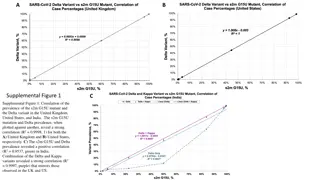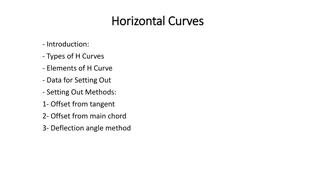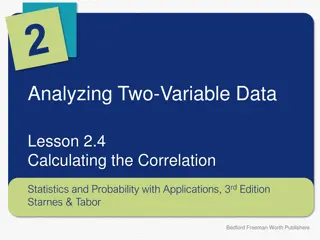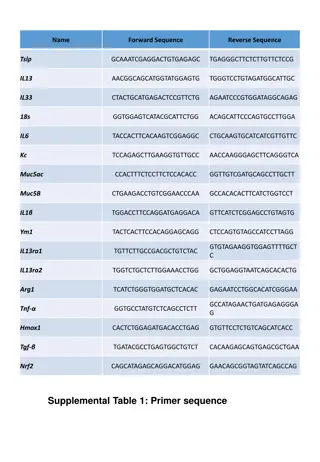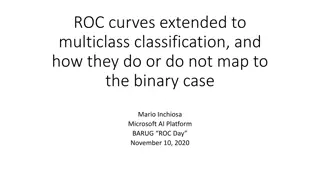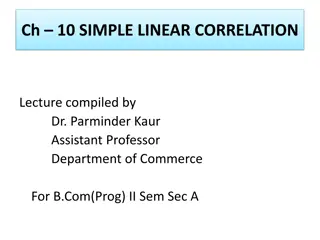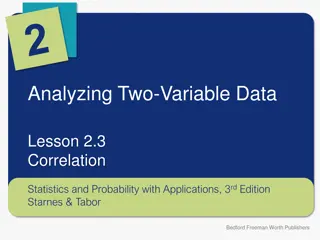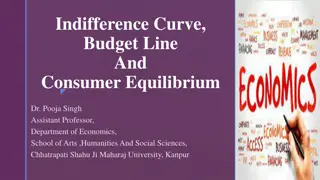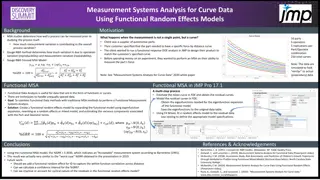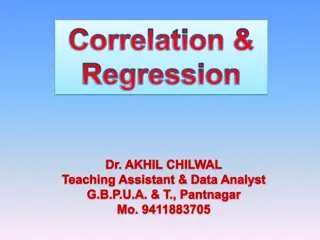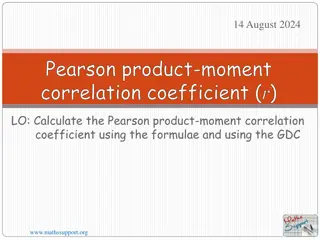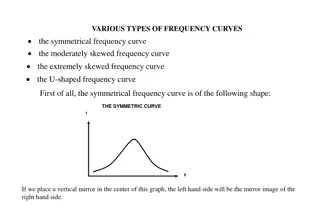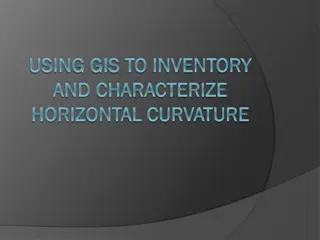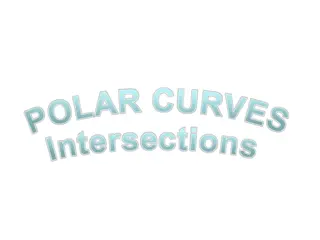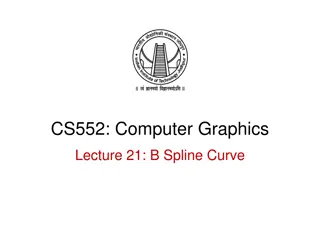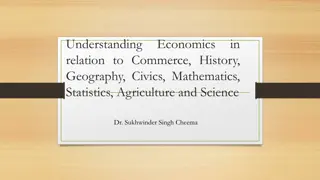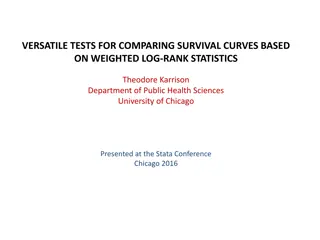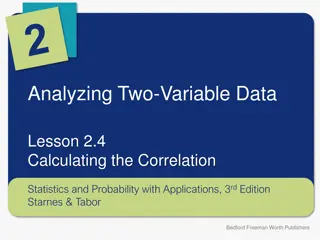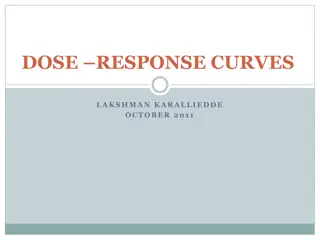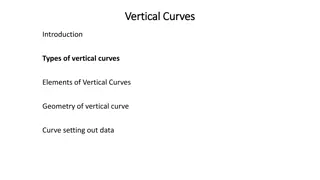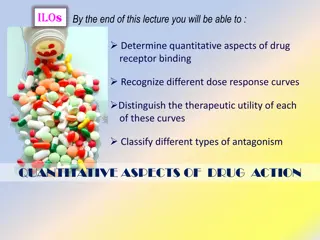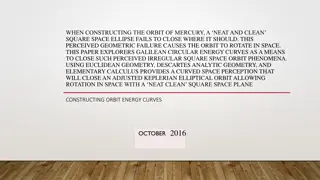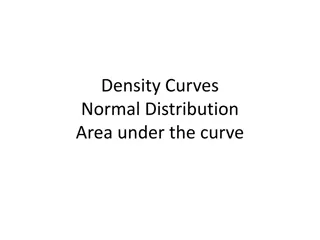Correlation of s2m G15U Mutant and Delta Variant Prevalence
The correlation between the prevalence of the s2m G15U mutant and the Delta variant in the UK, US, and India was analyzed, showing strong correlations in the UK and US, and a positive correlation in India. Analysis of the s2m phenotype in the Alpha, Delta, and Kappa variants was also conducted. Addi
3 views • 4 slides
Correlation Analysis in Statistics
Exploring the concept of correlation in statistics: from measuring the strength of linear relationships between variables to interpreting correlation coefficients and coefficients of determination. A practical example involving bass drum sales and TV appearances by a popular group illustrates how co
1 views • 23 slides
Horizontal Curves in Road Design
Horizontal curves are essential in road design to safely change alignment or slope. This article covers types of horizontal curves, setting out methods, geometric shapes of curves, and elements such as PI point, PC point, and radius. Learn why curves are crucial for modern highways and how different
0 views • 25 slides
Correlation in Two-Variable Data Analysis
This content discusses calculating the correlation between two quantitative variables, its properties, and how outliers can influence the correlation. It provides a step-by-step guide on how to calculate the correlation coefficient 'r' using z-scores. Additionally, it presents a practical problem of
1 views • 18 slides
Molecular Biology Study: Primer Sequences and Correlation Analyses
This study delves into the realm of molecular biology, focusing on primer sequences for various genes like IL13, IL33, Muc5ac, and more. Additionally, it explores PCA analyses of different study groups and correlation of variables using Pearson correlation coefficient. The research sheds light on th
0 views • 4 slides
ROC Curves in Multiclass Classification
ROC curves are extended to multiclass classification to evaluate the performance of models in scenarios such as binary, multiclass, and multilabel classifications. Different metrics such as True Positive Rate (TPR), False Positive Rate (FPR), macro, weighted, and micro averages are used to analyze t
3 views • 8 slides
Correlation and Causation in Data Analysis
A correlation analysis assesses the relationship strength and direction between two variables using the Pearson correlation coefficient. It's crucial to differentiate between correlation and causation, where correlation indicates a relationship but not causation. Exploring examples like ice cream sa
0 views • 13 slides
Geometric Design of Highway Vertical Curves and Criteria
This content covers the vertical alignment in transportation engineering, focusing on the geometric design of highway facilities, specifically vertical curves like crest and sag curves. It explains the main design criteria for vertical curves, including minimum stopping sight distance provision, dra
2 views • 24 slides
Simple Linear Correlation in Commerce: Lecture Compilation by Dr. Parminder Kaur
Correlation analysis is essential in understanding the co-variation between two or more variables. This lecture compiled by Dr. Parminder Kaur, an Assistant Professor in the Department of Commerce, delves into the definition of correlation, types of correlation such as positive/negative, simple/part
1 views • 12 slides
Petroleum Fraction Distillation Curves
Characterization and properties of petroleum fractions are essential for understanding their behavior, particularly through distillation curves. These curves depict the boiling points of crude oil or petroleum fractions, highlighting components' volatility ranges. Various methods like ASTM D86, True
0 views • 28 slides
Correlation in Two-Variable Data Analysis
Exploring the concept of correlation in analyzing two-variable data, this lesson delves into estimating the correlation between quantitative variables, interpreting the correlation, and distinguishing between correlation and causation. Through scatterplots and examples, the strength and direction of
0 views • 13 slides
Indifference Curve, Budget Line, and Consumer Equilibrium
Indifference curves and budget lines are essential concepts in economics to analyze consumer behavior and preferences. Dr. Pooja Singh, an Assistant Professor at Chhatrapati Shahu Ji Maharaj University, Kanpur, explains how indifference curves represent different combinations of goods that offer the
1 views • 9 slides
Functional Measurement Systems Analysis for Curve Data Using Random Effects Models
Measurement Systems Analysis (MSA) is crucial in determining the contribution of measurement variation to overall process variation. When dealing with curve data instead of single points, a Functional MSA approach using random effects models can be applied. This involves estimating mean curves, mode
0 views • 5 slides
Correlation and Regression in Data Analysis
Correlation and Regression play vital roles in investigating relationships between quantitative variables. Pearson's r correlation coefficient measures the strength of association between variables, whether positive or negative, linear or non-linear. Learn about different types of correlation, such
0 views • 26 slides
Scatter Diagram Method for Correlation Analysis
Scatter Diagram Method is a simple and effective way to study the correlation between two variables. By plotting data points on a graph, it helps determine the degree of correlation between the variables. Perfect positive and negative correlations, as well as high and low degrees of correlation, can
1 views • 11 slides
Quantitative Aspects of Drug Action
Explore the quantitative aspects of drug action, including drug receptor binding, concentration binding curves, dose-response curves, and types of antagonism. Learn to relate drug concentration to receptor binding capacity and response produced. Discover how concentration binding curves and dose-res
0 views • 29 slides
Pearson Product-Moment Correlation Coefficient
Pearson product-moment correlation coefficient, denoted by "r," is a numerical measure of the strength and direction of a linear relationship between two variables. It ranges from -1 to +1, where 1 signifies a perfect positive linear correlation, -1 a perfect negative linear correlation, and 0 no co
0 views • 18 slides
Various Types of Frequency Curves in Statistics
Explore different types of frequency curves such as symmetrical, moderately skewed, extremely skewed, and U-shaped curves. Symmetrical curves exhibit mirror images on either side, while skewed curves have longer tails on one side. Extreme skewness results in J-shaped or reverse J-shaped curves. The
1 views • 8 slides
Correlation in Quantitative Variables
Explanation of how to calculate correlation between two quantitative variables, the importance of outliers in correlation, and the impact of strength and direction on the correlation coefficient.
1 views • 26 slides
Robust Parity Test for Extracting Parallel Vectors in 3D
Fundamental primitives for visualizing 3D data include line features like ridges and valleys of a scalar field, stream lines of a vector field, vortices of a velocity field, and extremal curves of a tensor field. Parallel Vectors (PV) provide a unified representation of 3D line features, forming con
0 views • 27 slides
Automated Tool for Inventorying and Characterizing Horizontal Curvature in Roadways
Improving highway safety is a priority for transportation departments. This project aims to develop a tool that automates the identification and characterization of horizontal curves in roadway networks using GIS technology. Roadway curvature, including horizontal curves, plays a key role in predict
1 views • 26 slides
Supply and Demand in a Competitive Market
This content delves into the concept of supply and demand in a competitive market as described by the renowned economists Paul Krugman and Robin Wells. It covers the basics of a competitive market, the dynamics of supply and demand curves, movements along curves, market equilibrium, and how prices a
1 views • 42 slides
Polar Curves: Intersections, Areas, and Calculating Enclosed Areas
Explore polar curves, their intersections, areas enclosed by curves, and calculating enclosed areas using given equations. Learn to sketch graphs, find points of intersection, polar coordinates, and apply formulas for finding enclosed areas with examples provided.
0 views • 21 slides
B-Spline Curves in Computer Graphics
Exploring the advantages of B-spline curves over Bezier curves, this content delves into the representation, calculation of basis functions, and properties of B-spline curves. The discussion includes issues with Bezier curve representation, local control in B-spline curves, and the subdivision of th
1 views • 11 slides
Correlation in Economics and Education
Correlation in education refers to the technique of establishing reciprocal relationships between different subjects to enhance understanding. The etymological meaning of correlation stems from Latin roots, signifying interlinking. Various types of correlation such as vertical and horizontal correla
0 views • 33 slides
Vertical Alignment in Railway Track Geometric Design by Dr. Walied A. Elsaigh
Explore the vertical alignment of railway tracks through Dr. Walied A. Elsaigh's insights on curve length formulas, types of crest and sag vertical curves, properties of typical vertical curves, and a detailed example with solutions for calculating elevations at various stations along the curve. Lea
1 views • 10 slides
Versatile Tests for Comparing Survival Curves Based on Weighted Log-Rank Statistics
Overview of various statistical tests for comparing survival curves beyond the traditional log-rank test. The focus is on weighted log-rank statistics sensitive to non-proportional hazards scenarios, with examples and methodologies discussed. These tests aim to provide more nuanced insights into dif
0 views • 31 slides
Real-Time Co-optimization of Energy & Ancillary Services Demand Curves
Explore the concept of constructing demand curves for Regulation Up Service, Regulation Down Service, and Responsive Reserve Service from the ERCOT public data. Learn about modifying individual AS demand curves and allowing overlaps to enhance co-optimization and efficiency. Dive into an example AS
0 views • 17 slides
Correlation in Statistics
This lesson delves into calculating the correlation between two quantitative variables, exploring properties of correlation, addressing how outliers affect correlation values, and more. You will learn the steps to calculate correlation, understand its properties, and the importance of variable type
0 views • 10 slides
Dose-Response Curves in Pharmacology
Dose-response curves play a crucial role in pharmacology by illustrating the relationship between drug dosage and its effects. Researchers use these curves to determine potency, efficacy, and safety of drugs, helping to establish the required dose for desired outcomes. By comparing pharmacologic pro
0 views • 13 slides
Vertical Curves in Road Design
Vertical curves play a crucial role in connecting sloping road segments, such as summit and sag curves. Learn about the types of vertical curves, elements involved, and how to calculate curve lengths and distances for effective road design.
0 views • 12 slides
Quantitative Aspects of Drug Action
Explore the quantitative aspects of drug action, including drug receptor binding, dose-response curves, therapeutic utility, and types of antagonism. Learn about drug affinity, efficacy, potency, and the relationship between drug binding and concentration. Discover how concentration-binding curves a
0 views • 18 slides
Self guided tour of Heating Curves and Cooling Curves
Delve into the comprehensive study of heating and cooling curves. Understand the transformation of substances as heat energy is applied, observing phase changes from solid to gas. Follow step-by-step instructions to create graphs depicting temperature variations over time, focusing on water at diffe
0 views • 49 slides
Analysis of Miram Curves with Two-Dimensional Work Function Distributions
Life of thermionic cathode highly dependent on operating temperature, Miram curves show transition from temperature limited to space charge limited regimes. Explore the physical origins and experimental deviations from 1D theory. Develop a 1-1/2D model to solve Poisson & Vlasov equations in 2D consi
0 views • 15 slides
Correlation in Data Analysis
This content discusses how scatter graphs represent data relationships, interpreting correlations, and distinguishing causation from correlation. Learn about positive, negative, and no correlation through practical examples like city population studies and salary-age comparison. Dive into the basics
0 views • 17 slides
Constructing Curved Space Orbits with Energy Curves and Gfield Systems
This paper delves into the geometric complexities of constructing the orbit of Mercury, exploring Galilean energy curves to rectify perceived irregularities in square space ellipses. Through Euclidean and analytic geometry, alongside elementary calculus, a curved space perception is introduced to ap
0 views • 13 slides
Understanding Regression, Correlation, and PMCC
This collection of images and questions covers topics related to regression analysis, correlation, and the Product Moment Correlation Coefficient (PMCC). Explore concepts such as plotting data to form straight lines, rearranging equations for linear relationships, interpreting correlation coefficien
0 views • 15 slides
Linear Regression Analysis and Correlation Techniques
Learn about correlation and regression analysis in statistics for business, where you explore the relationship between variables through scatter plots, examine patterns, identify outliers, and calculate correlation coefficients to measure the strength of associations. Understand the properties of co
0 views • 56 slides
Understanding Density Curves and Normal Distribution in Statistics
Learn about density curves, normal distribution, and identifying distribution shapes like right-skewed, bimodal, and uniform. Explore how density curves represent data distribution in statistics.
0 views • 19 slides
Understanding Correlation in Statistics
Learn about correlation in statistics, from its definition to interpretation. Discover how correlation measures the strength of linear relationships between variables, the difference between positive and negative correlation, and why a correlation of 0 doesn't imply independence. Get insights into h
0 views • 20 slides
